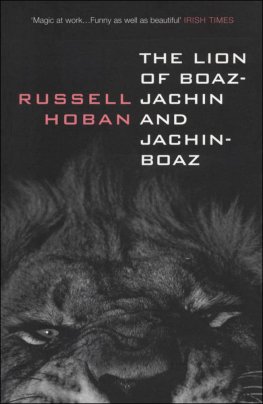Masatsugu Ono
LION CROSS POINT


I hated it. Detested it. I just wanted to get away as soon as I could.
His mothers whisper was like blades of grass, rustling, chafed by the wind. He tried to remember the expression on her face as she spoke, but he couldnt. Wanting to recall her voice more clearly, he closed his eyes, and when he did so he saw grassdry, sad, tired. The harder he tried to remember her voice the more chafed and torn the grass became. Patches of brown began to appear. Something was eating this wind-blown tangle, eating his mothers voice. What was it? He peered deep into the green mass, and the brown patches grew. He was probably too young to realize that the pest feasting on the grass was his own longing, his yearning to remember his mothers voice. If it kept on eating, it would soon form a chrysalis, taking the place of the bud it had consumed, and then form wings in place of the flower that would have grown. And then his mothers voice, and not just her voice but her expression too, would be recovered. But, mixed with the fluids and fibers of the buglike how a butterfly bears no resemblance to its caterpillarboth the voice and face would have become something entirely different. Soon, evening came. The faint light on the grass weakened and everything grew darker.
I hated it. Detested it.
The voice, the chafing grass, grew hoarse. Darkness and silence. And then, after what could have been a moment or could have been a day, there was brightness. Although the things on which the soft light fell were the same as ever, in fact because they were the same as ever, Takeru was still here, in this place that his mother hated, and his brother was not beside him. He wondered if, just as he was without his mother and brother, some of the things around him might have lost their shadows too.
But to Takeru it didnt seem like such a terrible place. The sea was close. He could hear it when he shut his eyes. The gentle sound of the waves brought him deep and restful sleep. He had grown slow to wake, slow to rise. The village was on a narrow stretch of land between a coastal inlet and its surrounding hills. He had come here, to his mothers birthplace, to spend the summer vacation with Mitsuko. He didnt know what the connection was between Mitsuko and his mother. They could have been aunt and niece, or cousins of very different ages, or perhaps more distant relations. Regardless, Mitsuko was of an age at which she could easily have been taken for ten-year-old Takerus grandmother. She was a small, cheerful, energetic person, her back slightly hunched, her waist and shoulders thick-set. Short dense hair hemmed her narrow forehead. It was dyed black, but showed white at her temples. Her face was always either serious or smiling. Looking at Mitsuko, Takeru realized that his mothers expression was probably always somewhere in between. But in the broad range between a serious, brooding look and a smile, Takeru could find nothing to hold on to. So he was never able to build an image, and his mothers face slipped like smoke between the fingers of his memory.
Im only here for the summer, right?
That what ya been told? replied Mitsuko.
Takeru didnt answer.
First I heard of it, said Mitsuko. Who said that?
Then, looking deep into Takerus eyes, she asked, You wanna go home? Back to your ma?
Again, Takeru said nothing.
Mitsuko smiled.
If ya wanna stay, you can, long as you like.
Mitsuko always gave Takeru a way out. If he didnt answer a question hed feel stranded in a dark holebut then shed gently open a door. Even when he wanted to speak, he wasnt good at it; and there were some things he didnt know if he could speak about at all. For a child like him, a woman like Mitsuko was bound to be a comfort. And everybody here was kind, not just her. Not that hed met that many people.
That day, as he woke from a nap, he had the vague feeling that Bunji was in the room. He wondered why Bunji didnt leave the area. It couldnt simply be because people here were kind. Perhaps these thoughts came to him because he had just been dreaming about his brother. In the dream his brother had been asleepface down, one cheek pressed against a tatami mat, his mouth squashed and pouting like a fishs, a strand of drool hanging from his lip. They were in the apartment in Akeroma where they had lived with their mother, though she had almost always been away. The cries of cicadas poured in through the open window, a shower of sound that smothered all other noise, yet seemed to intensify the smell of rotting garbage that clung to the air. Unless the garbage was in the apartment, the smell must have come in through the window as well. Perhaps the flapping of agitated crows fanned it in. The window had no curtains and the fierce afternoon sun burned down on the tatami where his brother lay. From time to time his brother groaned. He tossed and turned. It was as though when asleep, yes, only when asleep, Takerus brother too might have felt troubled. Was that true? It was Takeru who was troubled, desperate at the thought of his brother waking up his usual self. No, he wasnt. He was used to it. Was that true? You couldnt get inside someone elses sleep, so even if there was a maelstrom in his brothers head, he wouldnt be able to witness it. But thered be even less chance of finding out once his brother was awake, wouldnt there? His brother wouldnt reply, couldnt reply.
Of course, Takeru knew perfectly well that what he was doing wouldnt get him inside his brothers mind. Yet in the depths of sleep his brother looked so defenseless (but against what, whom?), submissive (but to what, whom?), and exposed (but to what, whom?). At the same time his little body was like impenetrable armor. It protected his mind, hidden away within. It was closedfirmly and stubbornly. As though tempted by the very strangeness of it, Takeru lowered his clenched fist to his brothers face. One cheek was flat against the floor. The other bulged upward, and Takeru pushed his fist gently against it. He suddenly increased the pressure and, thinking this might be a way to break through the armor, rotated his fist left and right. Then from behind his ears, from the depths of the dreamno, from somewhere quite unknownhe heard that voice, that bizarre, high-pitched, strangled voice:
Dont! Dont do that!
It was no longer his brother who turned in his sleep, but Takeru. He woke up.
He knew the person whose voice it was would be there when he opened his eyes. He was always there. Bunji. His face, with its little eyes and nose, forming its usual expressiona smile? confusion?looking down at Takeru. Or perhaps Bunji wasnt looking at Takeru. To Takeru, those eyes seemed to look inward, inside Bunji himself. But how can somebodys eyes, that only ever point outward, look within?
Like this.
Thats what old Tsuru in the village would have said. Tsuru was always sitting at the bus stop at the intersection, where the main coastal road from the north meets a local road that leads to another village on an inlet to the east. Veins stood out on his palms like worms, and in the warmth of one of those palms he kept his fake eye. He liked to roll it around and then put it, backward, into his left eye socket. Takeru couldnt get used to it. He stiffened with disgust every time Tsuru did it. Tsuru would look at Takeru and smilea faint slit appearing between his thin, wrinkled lips.
Takeru never asked Tsuru what he could see with the eye in backward. It seemed to Takeru that at the back of Tsurus empty eye socket, at the back of his mouth too, there would be an expanse of terrifying darkness.










